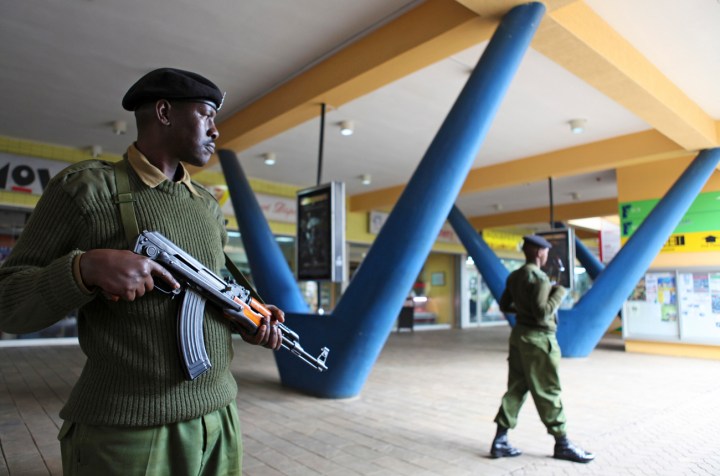Africa
Kenya faces up to the realities of war with terrorists

More than a week after Kenya launched its full-scale military offensive into Somalia, Kenyans are beginning to understand the implications: war is dangerous and difficult, even on the home front. Already things are beginning to go wrong. By SIMON ALLISON
Most serious, from a Kenyan point of view, were the twin grenade attacks which shattered the calm of Nairobi. The first targeted a nightclub early Monday morning, while the second hit commuters waiting to board one of Nairobi’s ubiquitous “matatus”, or minibus taxis. In total, one person was killed and another 32 injured, some critically; one casualty is likely to have his leg amputated, while another might lose sight in one eye.
Kenyan police were quick to downplay the inevitable speculation that the grenade attacks were the work of al-Shabaab, pointing out that no firm link had yet been established. Al-Shabaab themselves offered no comment. In addition, grenades are not al-Shabaab’s usual modus operandi; the Islamist militant group has a history of organising spectacular suicide bombings with much larger loss of life, such as the coordinated blasts in Kampala which killed nearly 80 during the soccer World Cup final in 2010.
Nonetheless, it’s hard to see how it could have been anyone else. After all, ever since Kenyan forces crossed the border into Somalia on a mission to hunt down al-Shabaab, the group have been promising retaliation. One spokesman promised to bring “the flames of war” to Nairobi, and on Saturday the US Embassy issued a public warning of an imminent al-Shabaab attack in Nairobi. And while the grenade attacks might not be al-Shabaab’s traditional style, it’s also true that major terrorist attacks usually take months of careful planning to execute effectively. Al-Shabaab – who let’s not forget are also fighting off major military offensives on several fronts – have hardly had the time to organise anything more elaborate. To prevent more attacks, Kenya has beefed up security massively and banned fireworks for the Hindu Diwali celebration.
As Kenyans worry about the human cost, they’re also struggling to understand how the government can afford the unprecedented military operation. Even before the army was deployed, Kenya was facing a budget shortfall of nearly 20% of its planned expenditure. That’s a lot of money, especially given the ever-weakening Kenyan shilling and the major losses predicted for Kenya’s crucial tourist industry. So far, the government and the military are keeping quiet about how much the war is costing them, and how exactly it’s being paid for.
Some in the government has also been at pains to stress that the fight against al-Shabaab is not a fight against Kenya’s large Somali community, many of whom are now naturalised Kenyans. Others have been more blunt. “This [the al-Shaabab issue] is like a big animal, with the tail in Somalia, and the head of the animal is hidden here in Eastleigh,” said Internal Security assistant minister Orwa Ojodeh, while addressing Parliament. Eastleigh, a suburb of Nairobi, is known as “Little Mogadishu” for its huge Somali contingent, and here tensions are reported to be running high after a security crackdown on anyone with suspected al-Shabaab links. Ojodeh promised a further crackdown, which he described as the “mother of all operations”, once Kenya’s offensive in Somalia is concluded – whenever that may be.
With all these problems on the home front, it’s easy to forget that across the border there’s a war going on. Kenyan troops continue to make slow but steady progress, and are getting closer to the strategic town of Afmadow, where al-Shabaab reportedly plans to make a major stand. But their mission was undermined on Tuesday by an apparent change of heart from Somalia’s president Sheikh Sharif Sheikh Ahmed, who told media on Monday that he had not authorised the Kenyan invasion. “Somalia’s government and its people will not allow forces entering its soil without prior agreement,” Sharif told reporters in Mogadishu. “There is only one thing we know about the Kenyan forces, and that is their offer of training to the national army of Somalia.”
Initially, the Kenyan offensive was thought to be in cooperation with Somali government forces, and reports from the frontline seemed to bear this out. Moreover, an agreement was signed last week between the two governments which promised that Kenya and Somalia would “cooperate in undertaking security and military operations”, which appeared to legitimise the Kenyan offensive. President Sharif’s unexpected statement might be an attempt to distance himself from what some Somalis see as an unwelcome foreign intervention.
But his comments have caused confusion in southern Somali areas where the Kenyan incursion has been welcomed. Reuters reported that his remarks caused protests on Tuesday in the city of Dhobley, recently taken by Kenyan troops. And a government military official rather ominously commented: “The Somali government does not support al-Shabaab. It is only the president and that will be solved.”
For now, while Kenyan troops continue to advance and al-Shabaab remains on the backfoot, all these issues are relatively minor, and a decisive victory will sweep them under the carpet. But if al-Shabaab starts gaining the upper hand, Kenya will find that its Somali adventure will cause far more problems that it solves. DM
Read more:
- Deadly explosions hit Nairobi, in Kenya’s the Standard;
- Somali president opposes military intervention, on AFP;
- The real cost of war against Al Shabaab terrorists, in Kenya’s Daily Nation; and
- Eastleigh jittery over crackdown, in Kenya’s Daily Nation.
Photo: An administration policeman keeps guard outside a shopping mall in the suburbs of Nairobi on 25 October 2011. Two grenade blasts killed one person and wounded more than 20 in Nairobi on Monday. Reuters.



















 Become an Insider
Become an Insider